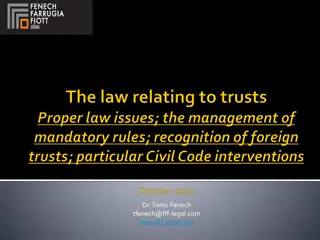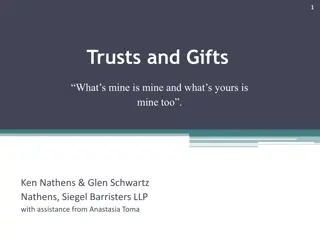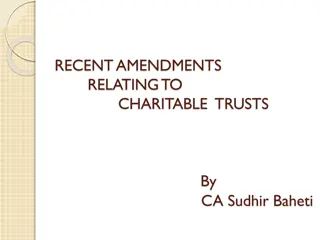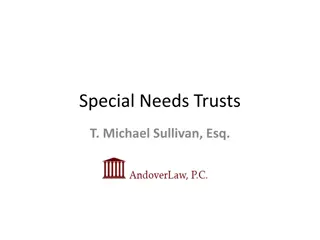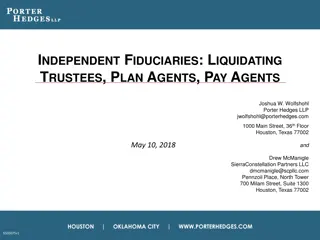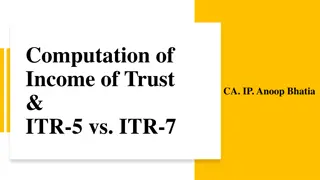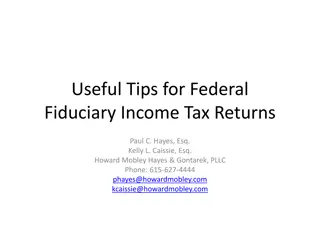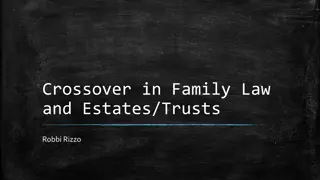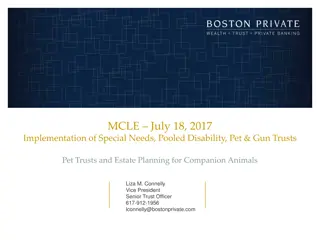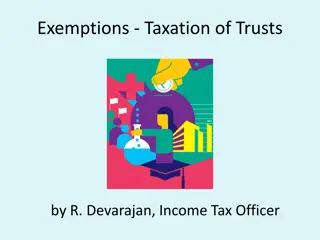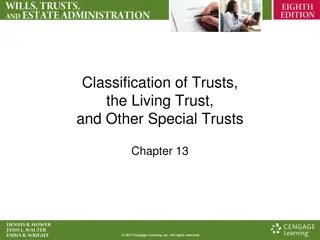Wispact Special Needs Trusts in Wisconsin
Wispact is dedicated to improving the lives of individuals with disabilities in Wisconsin through the management of special needs trusts. These trusts provide more opportunities and a better quality of life by preserving resources while maintaining eligibility for means-tested public benefits. Eligibility is open to any Wisconsin resident with a disability, with trust applications required to be submitted through a licensed attorney. Assets held in a Wispact Special Needs Trust are exempt resources for Wisconsin Medicaid and SSI purposes, allowing individuals to supplement their long-term needs.
Download Presentation

Please find below an Image/Link to download the presentation.
The content on the website is provided AS IS for your information and personal use only. It may not be sold, licensed, or shared on other websites without obtaining consent from the author.If you encounter any issues during the download, it is possible that the publisher has removed the file from their server.
You are allowed to download the files provided on this website for personal or commercial use, subject to the condition that they are used lawfully. All files are the property of their respective owners.
The content on the website is provided AS IS for your information and personal use only. It may not be sold, licensed, or shared on other websites without obtaining consent from the author.
E N D
Presentation Transcript
Wispact Special Needs Trusts GWAAR EBS Training April 2017
Wispacts Mission We improve the lives of people of all ages with disabilities across Wisconsin through the management of special needs trusts to provide more opportunities, and a better quality of life. choice, more
Wispact Information Phone: 608-268-6006 Website: www.wispact.org
What is a Trust? Settlor Trust Protector Instructions $$$ Trustee (Holds the Distributions Trust) Beneficiary
What is a Wispact Special Needs Trust? Settlor Trust Protector Wispact Beneficiary or Third Party Analysis of distribution and distribution instructions $$$ Trustee (Chemical Bank) Distributions for sole benefit of beneficiary Beneficiary
Special Needs Trusts WHY? Why would a person need a Wispact Special Needs Trust? 1) EXEMPT: Assets held in a Wispact Special Needs Trust are an exempt resource for Wisconsin Medicaid and SSI purposes. 1) See MEH 16.6.6 2) See POMS SI 01120.200 1) NOT A DIVESTMENT: Transferring assets to a Wispact Special Needs Trust for your own benefit is not a divestment. There are also exceptions to funding trust for a person s disabled child these are very individually-specific rules and they should speak with an attorney. 1) See MEH 17.13.4
Special Needs Trust WHY? Preserve excess resources while maintaining eligibility for means-tested public benefits. Resources held in a SNT are professionally managed and distributed per strict regulations and guidelines, however they enable an individual on means-tested public benefits to supplement their long-term needs and improve their quality of life.
Who is eligible to create a Wispact Special Needs Trust? Qualifications: Any Wisconsin resident with a disability can create a Wispact Special Needs Trust. NOTE: Wispact requires that every trust application is submitted through the assistance of a Wisconsin licensed attorney. Most elder law and special needs planning attorneys are familiar with Wispact trusts and the trust creation process. Even if you are over age 65 you must have a disability determination in order for the funds in your Wispact Trust to be considered exempt.
Someone over age 65 needs a Disability Determination?? YES!!! MA Eligibility (generally): 1) Non-Financial: EBD (Elderly, Blind or Disabled); Elderly = +65. 2) Financial: Assets under $2,000 What about the assets in the Wispact Trust?? In order to exempt the SNT from the FINANCIAL component of eligibility, the person needs to be determined disabled. Though they may be +65, they still need the formal Disability Determination, typically achieved by filing a MADA application and writing Wispact at the top.
What clients might need a Wispact Special Needs Trust? Creating and funding a Special Needs Trust is an option for anyone who needs to do a spend down if they suddenly need to qualify for means-tested benefits, or if they are currently enrolled in means-tested benefits and they come into a windfall. Individuals on MA and/or SSI that receive a personal injury settlement, sell their property, receive an inheritance, receive a divorce settlement, cash in a life insurance or retirement account, among other situations. Why can a SNT be a good option? Rather than quickly, and perhaps wastefully, spending down in the month in which they receive the settlement, preserving funds in a Wispact Special Needs Trust allows the person to save the funds to pay for ongoing long term needs.
What can go into a Wispact Trust? Generally, only cash is accepted into a Wispact Trust. Sometimes the Trustee may make exceptions for non- cash, unique , assets however this is a formal request procedure completed with their attorney and is decided on a case-by-case basis and only under very specific situations.
What does Wispact do? Wispact , Inc. is a 501(c)(3) non-profit organization that manages over 2,500 individual special needs trust sub-accounts. Wispact was started in 2003, through a joint effort of Wisconsin s elder law community and several disability advocacy groups. We have a Board of Directors consisting of elder law and special needs planning attorneys and advocates, financial professionals, and members of the special needs advocacy community. Wispact staff can provide basic information to consumers about Wispact operations and SNTs in general. Wispact processes new trust applications and if approved sets up a new trust account with our Trustee, Chemical Bank. Each Wispact Beneficiary is assigned a BeneficiarySpecialist who is their main point of contact to request distributions and answer other questions related to their Trust.
Distributions from the Trust A Beneficiary or their legal representative can contact Wispact and make a Request for Distribution Wispact Beneficiary Specialists review each distribution request and analyze whether there are any regulatory or other problems with the request. Primary Distribution Rules: The Sole Benefit Rule 1) - All distributions must be for the Beneficiary s sole benefit only In Kind Support and Maintenance violations? 2) - SSI recipients (generally) cannot receive distributions that pay for food or shelter expenses. Is the distribution prudent? 3) Does the distribution violate any other trust or benefit rule? 4)
What can you use funds in a Wispact Special Needs Trust For? Common Distributions: 1) Dental expenses not otherwise covered 2) Private room differential 3) Health and beauty expenses 4) Entertainment (books/movies/cable tv) 5) Travel (possibly also a travel companion) 6) Healthcare and prescription medication co-pays 7) Private caregiver (see next slide)
Utilizing the funds in a Wispact Trust to pay a private caregiver With cuts to MA-covered in-home caregivers, preserving funds in a Wispact Trust may allow a person to privately supplement necessary caregiving hours. E.g. a person is only approved for 5 hours of in-home care but they prefer more hours; they may privately engage with a caregiver to provide supplementary hours and privately pay them through their trust. How is this relationship set up? The beneficiary must engage with an attorney to create a Personal Services Contract, outlining the services to be provided by the caregiver and the compensation. If approved, the caregiver is paid through a fiscal intermediary (e.g. GT Independence) and all payroll is paid through them, the Trust is not the employer.
How are bills paid? We cannot ever give a Beneficiary cash! We require receipts for all RFDs! How do people typically get things paid for? Automatic recurring payments sent to Wispact note Wispact will not review the bill (e.g. it is convenient to send your cable bill directly to Wispact to pay each month, but it is the beneficiary s responsibility to review their bill we won t call to ask if they really watched 3 movies that month.) Direct payments to vendors; Reimbursements to Trust Agents; Credit card payments.
What cant you use Trust funds for? Common confusing SNT rules: The Trust cannot buy gifts, even at Christmas! The Trust can only pay the Beneficiary s pro-rata share of household expenses. If 4 people live in the house we can only pay for of the electricity bill. If the person is on SSI, we generally cannot pay for food or shelter expenses as this is considered in-kind-support and maintenance and will reduce their SSI dollar for dollar, maxed out at 1/3 of the FBR.
What happens to the funds in the Trust when the person dies? It depends on the type of Trust a person has: 1) Wispact Trust I (aka D4C Pooled Trust) When a Beneficiary passes away our Trustee notifies the Wisconsin Estate Recovery Program. If the person has an Estate Recovery Payback Claim against them, then how the trust is paid out depends on two factors what is left in their trust and what is owed to Estate Recovery. - If what is left in the trust is insufficient to payback Estate Recovery, then the funds are retained by the Wispact charitable fund for the benefit of other Wispact beneficiaries. - If what is left in the trust is more than the payback amount, then the ER claim is paid and the remainder is paid to the Trust Creator s heir choice. -
Payout upon death cont. 2) Wispact Trust II Third Party Trust. As the assets were never the Beneficiary s during their lifetime, they are not subject to Estate Recovery Payback and are paid out as dictated by the Creator s Trust document.
Wispacts Charitable Fund Wispact beneficiaries can apply for charitable grants to cover any needs that their trust may not be able to cover for them or the purchase of which would greatly deplete their trust. Common examples: Advocacy grants are available to hire an attorney/ other advocate to fight an overpayment, an eviction, bankruptcy, etc. One particularly popular advocacy grant is our Creation Subsidy Program, where smaller trusts can have their legal feels offset at the time of trust creation and their set-up fee reimbursed. Dental grants are available to pay for dental work that their trust cannot cover. Transportation grants are available to pay for needed transportation expenses, e.g. bus passes. Therapies / health care expenses not otherwise covered Financial Literacy e.g. assistance with budgeting
In Conclusion Wisconsin is a national leader in the field of Special Needs Trust administration. A Wispact Trust can be a great alternative for your clients to a wasteful spenddown. Supplementing a person s long term needs makes a person healthier and is a true cost-savings to our public benefits programs.

 undefined
undefined







